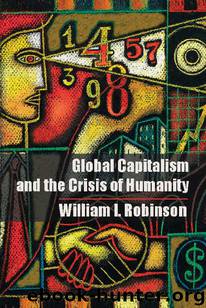Global Capitalism and the Crisis of Humanity by William I. Robinson

Author:William I. Robinson [Robinson, William I.]
Language: eng
Format: epub
Publisher: Cambridge University Press
Published: 2014-07-27T21:00:00+00:00
Imperialism and the Extensive and Intensive Enlargement of Capitalism
If the world is not divided into rival national economies and national capitals, do we still need a theory of imperialism? Is there any contemporary relevance to the concept? During the post–World War II period, and drawing on the tradition established by Rosa Luxembourg, Marxists and other critical political economists shifted the main focus in the study of imperialism to the mechanisms of core capitalist penetration of Third World countries and the appropriation of their surpluses. Imperialism in this sense referred to such exploitation and also to the use of state apparatuses by capitals emanating from the centers of the world system to facilitate this economic relation through military, political, and cultural mechanisms. If we mean by imperialism the relentless pressures for outward expansion of capitalism and the distinct political, military, and cultural mechanisms that facilitate that expansion and the appropriation of surpluses it generates, then it is a structural imperative built into capitalism. It is not a policy of particular core state managers (to see it as such was Hobson’s fallacy) but a practice immanent to the system itself. The imperialism practiced by the Bush White House was nothing particular to a group of neo-conservative politicians and organic intellectuals in the United States. And the Obama White House continued such practices, notwithstanding particular conjunctures and distinct policies and strategies among elites.
We need tools in order to conceptualize, analyze, and theorize how this expansionary pressure built into the capitalist system manifests itself in the age of globalization. We need these tools politically so as to help make effective our confrontation with the system. I would agree to this extent with Kiely that a theory of imperialism “remains indispensable for understanding both the contemporary world order and the place of the South in that order.”59 Yet, even at that, capitalist imperialism is considerably more complex under globalization than the facile North-South/core-periphery framework through which it is typically viewed. The class relations of global capitalism are now so deeply internalized within every nation-state that the classical image of imperialism as a relation of external domination is outdated. Failure to comprehend this leads to such superficial and misleading conclusions as, for instance, that popular projects failed to materialize under the rule of the Workers Party in Brazil or the African National Congress in South Africa because of a “sell-out” by the leaders of those parties or simply because “imperialism” undercut their programs. Imperialism is not about nations but about groups exercising their social power – through institutions – to control value production, to appropriate surpluses, and to reproduce these arrangements. The challenge for such a theoretical enterprise is to ask: how and by whom in the world capitalist system are values produced (organized through what institutions), how are they appropriated (through what institutions), and how are these processes changing through capitalist globalization? During the 500 years since the genesis of the world capitalist system, colonialism and imperialism coercively incorporated zones and peoples into its fold. This historical process of “primitive accumulation” is coming to a close.
Download
This site does not store any files on its server. We only index and link to content provided by other sites. Please contact the content providers to delete copyright contents if any and email us, we'll remove relevant links or contents immediately.
International Integration of the Brazilian Economy by Elias C. Grivoyannis(106928)
The Radium Girls by Kate Moore(12001)
Turbulence by E. J. Noyes(8001)
Nudge - Improving Decisions about Health, Wealth, and Happiness by Thaler Sunstein(7678)
The Black Swan by Nassim Nicholas Taleb(7086)
Rich Dad Poor Dad by Robert T. Kiyosaki(6574)
Pioneering Portfolio Management by David F. Swensen(6269)
Man-made Catastrophes and Risk Information Concealment by Dmitry Chernov & Didier Sornette(5980)
Zero to One by Peter Thiel(5765)
Secrecy World by Jake Bernstein(4727)
Millionaire: The Philanderer, Gambler, and Duelist Who Invented Modern Finance by Janet Gleeson(4446)
The Age of Surveillance Capitalism by Shoshana Zuboff(4267)
Skin in the Game by Nassim Nicholas Taleb(4223)
The Money Culture by Michael Lewis(4173)
Bullshit Jobs by David Graeber(4161)
Skin in the Game: Hidden Asymmetries in Daily Life by Nassim Nicholas Taleb(3973)
The Dhandho Investor by Mohnish Pabrai(3741)
The Wisdom of Finance by Mihir Desai(3718)
Blockchain Basics by Daniel Drescher(3564)
